Kingdom of Women
In the legendary foothills of southwestern China, the Mosuo uphold one of the world’s last matrilineal societies. As tourists flock to the region in larger numbers, bringing their money and clashing values with them, can female-first traditions endure?
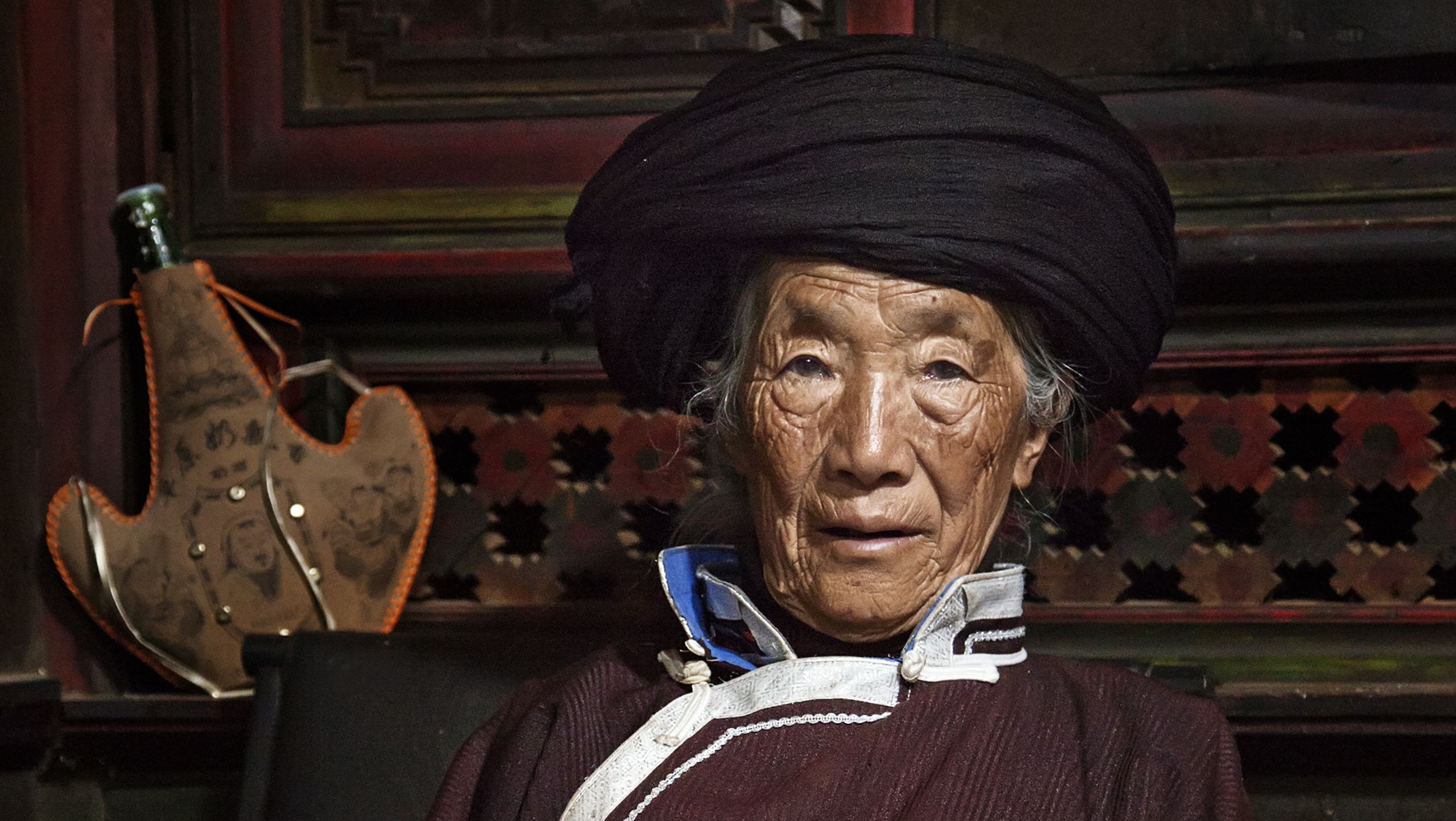
It’s almost lunchtime, and 29-year-old Sadama Rada is helping her mother and aunt prepare a meal of salt pork, potatoes, and fresh greens pulled from the family farm in the village of Shekua. Seated by the hearth fire between a carved wooden bedchamber and hand-painted Buddhist mural is Ku Mu, Rada’s grandmother. Dressed in a traditional wool jacket and pantaloons, her head wrapped in an indigo turban, she sips a glass of homemade corn wine with an air of detached authority while the rest of the women make small talk. As the head of the household, or dabu, 80-year-old Ku Mu is the undisputed boss, in line with the traditions of the Mosuo, said to be the last matrilineal society in China and one of few left in the world.
Hungry male relatives file through the door: first an uncle, then a younger cousin, and finally Rada’s father, Wang Ji Zengheng, on break from his job as a boatman guiding tourists on the nearby lake. He’s just visiting. The Mosuo practice a custom called zouhun, or “walking marriage,” in which most men live separately from their wives and children and do not play a significant role in the children’s upbringing, though they do financially support their families. Apart from brief “walking” visits to the women’s home—for sex at night or meals during the day—men largely keep to themselves. Sons, including Rada’s 33-year-old brother, live at home until they are in their 30s, when they opt to live alone or leave to find work. Walking marriages are monogamous, and most women only accept visits from their child’s father, but affairs are not unusual, so long as they are discreet. In the Mosuo language, there are no words for husband or jealousy. Lunch is spiked with tingling Sichuan pepper and eaten in comfortable silence. Zengheng, 52, is quiet and shows no outward affection toward Rada’s mother, which is standard practice. As soon as the men leave the room, the casual chatter picks up again among the women. Dabu turns to me with a sly grin. “Men speak a different language from us,” she whispers. “We like them and we need them, but we also value our freedom.”
Men speak a different language from us. We like them and we need them, but we also value our freedom.
Chinese families have long preferred boys to girls, leading to a troubling surplus of men in the world’s most populous country. Not so in this pristine community spread across a high plateau in the Himalayan foothills between Yunnan and Sichuan provinces, where the legend of Shangri-La was born. In the pinewood villages that ring Lugu Lake, the jewel of the Mosuo heartland, girls are preferred over boys. An estimated 40,000 members of the ethnic minority cling to the belief that everything vital in the world originates from a woman, earning the region the nickname Kingdom of Daughters.
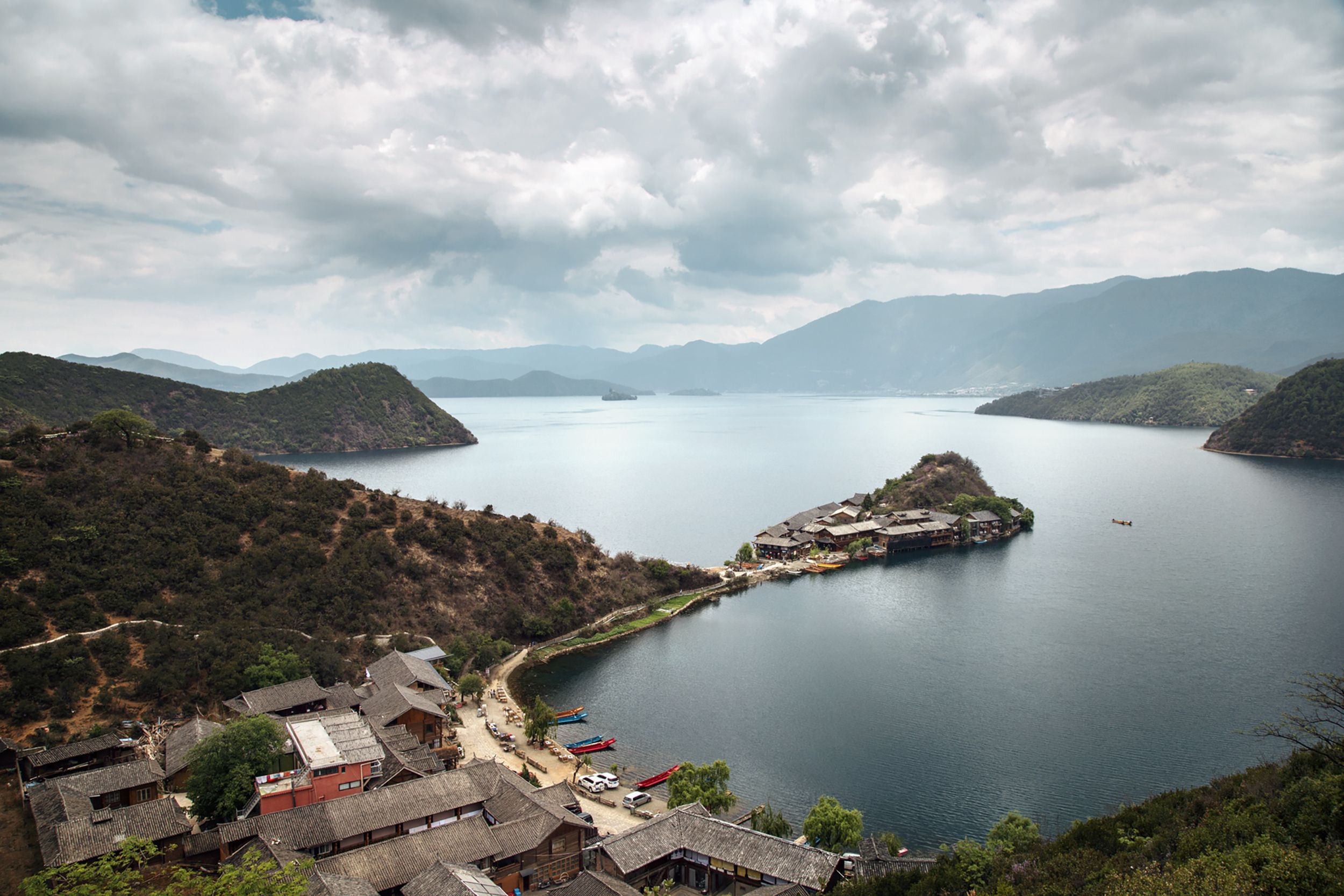
Lugu Lake, the jewel at the center of Mosuo country, straddles China’s Sichuan and Yunnan provinces.
At the core of Mosuo tradition is the belief that women are more valuable and intellectually superior to men. Family life revolves around a matriarch who owns property, controls inheritance rights, and has the last word on domestic decisions. All children are raised by the mother’s side of the family and take their mother’s surname. Maternal uncles live under the women’s roof and help care for the children, essentially playing the role of father. “In our culture, girls are very important,” explains Rada. “But we don’t push away our men.”
While the Mosuo are perhaps the best known of the matriarchal societies that endure worldwide, the Minangkabau of West Sumatra, Indonesia, at 4 million strong, are the largest community with women-centric traditions. Similar to the Mosuo, women preside over household affairs while men handle political and spiritual duties. (The Minangkabau practice formalized marriage, but women sleep in their own quarters, and husbands must leave at dawn.) In Ghana, the Akan people live under “matriclans”—matrilineal social structures that dictate one’s status and inheritance. Among the Garo of northeast India, property and political roles are transferred from mother to daughters. Relatives of older daughters, though, are tradition-bound to capture the potential groom, who, by local custom, must try to flee. If he can be caught and persuaded to marry, he lives in the woman’s house. The couple can break the union at any time, without stigma.
These far-flung societies are outliers in a global landscape long dominated by patriarchy. The mythological Amazons of modern-day Turkey are depicted as beautiful and fierce female warriors who used men for reproduction. (Male offspring were either killed or given back to their fathers; daughters were reared by women and taught to be warriors and hunt freely.) Many historians dispute the truth and origins of this myth, yet evidence points to a matriarchal “prehistory” dating back to the ancient Greeks and before, wherein societies worshipped goddesses, and women were revered for their life-giving powers. For instance, during the Bronze Age on the island of Crete, Minoan women directed all aspects of daily life, including religious ceremonies. Sex was ritual communion, and partnership between the sexes made for a level of violence exceptionally low for the era.
Crime is minimal; there are no words for murder or rape.
All these millennia later, similar dynamics are present in the Mosuo culture. Crime is minimal; there are no words for murder or rape. But since the Mosuo have no written language, their origins are hard to pin down. History is passed from generation to generation by word of mouth, leaving stories open to variation. Some anthropologists believe Mosuo heritage can be traced to Mongolia, while others say they are native to southwestern China, where they have farmed and raised livestock for nearly 2,000 years. But because Chinese texts refer to the Mosuo by many different names, and the government has mistakenly classified them as belonging to the Naxi ethnic minority group, a definitive account of their genesis does not exist. Instead, there are legends.
Get exclusive access to fashion and beauty trends, hot-off-the-press celebrity news, and more.
Rada recounts the tale of the Goddess Mountain that looms at the lake’s edge: There was once a wise beauty named Gemu, the most desirable woman in the land. One day, while picking herbs in the forest, she crossed paths with the hunter He Long. It was love at first sight. They spent every moment together until the devil showed up. In a fit of envy, he turned them both to stone. Gemu became the Goddess Mountain and He Long an island within sight but out of reach. It’s said Gemu’s tears swelled to form Lugu Lake.
These days, a different kind of threat is appearing: tourists. The allure of powerful women and staggering natural beauty is attracting more visitors each year from other parts of China. In 2012 alone, 1.5 million tourists visited the Lugu Lake region. And while the influx has brought much-needed income to a poor pocket of the country, some worry that external forces are degrading one of the last true outposts of matriarchal culture, as younger generations come under the influence of foreigners, marry non-Mosuo, and relocate to cities. There are growing doubts about whether Mosuo traditions will continue to endure as an alternative model to the patriarchal mores that prevail around the world.
The clash is most apparent in Luoshui, the most developed of the towns. Tacky hotels dripping with Mosuo kitsch line the waterfront. Men dressed in traditional garb distribute flyers for cultural shows, karaoke bars, and casinos. At night, prostitutes, most of whom come to Luoshui from other parts of China, pose as Mosuo girls for men revved up on the fantasy of local women. Fishermen complain that the excess of visitors and poor municipal waste disposal have polluted Lugu Lake and depleted once-abundant fish stocks. But in the agrarian villages across the water, life still moves to a timeless rhythm.
RELATED STORIES
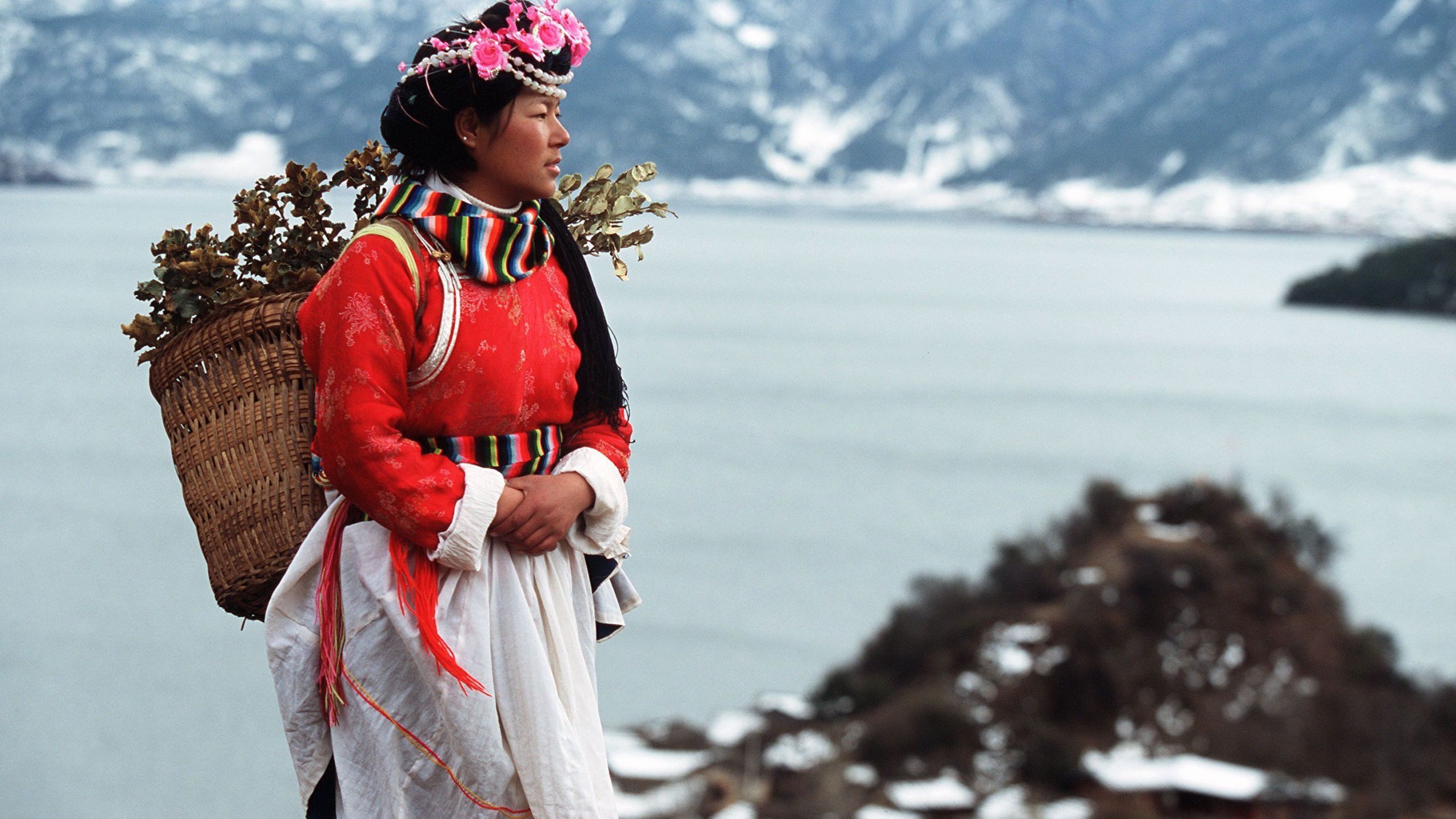
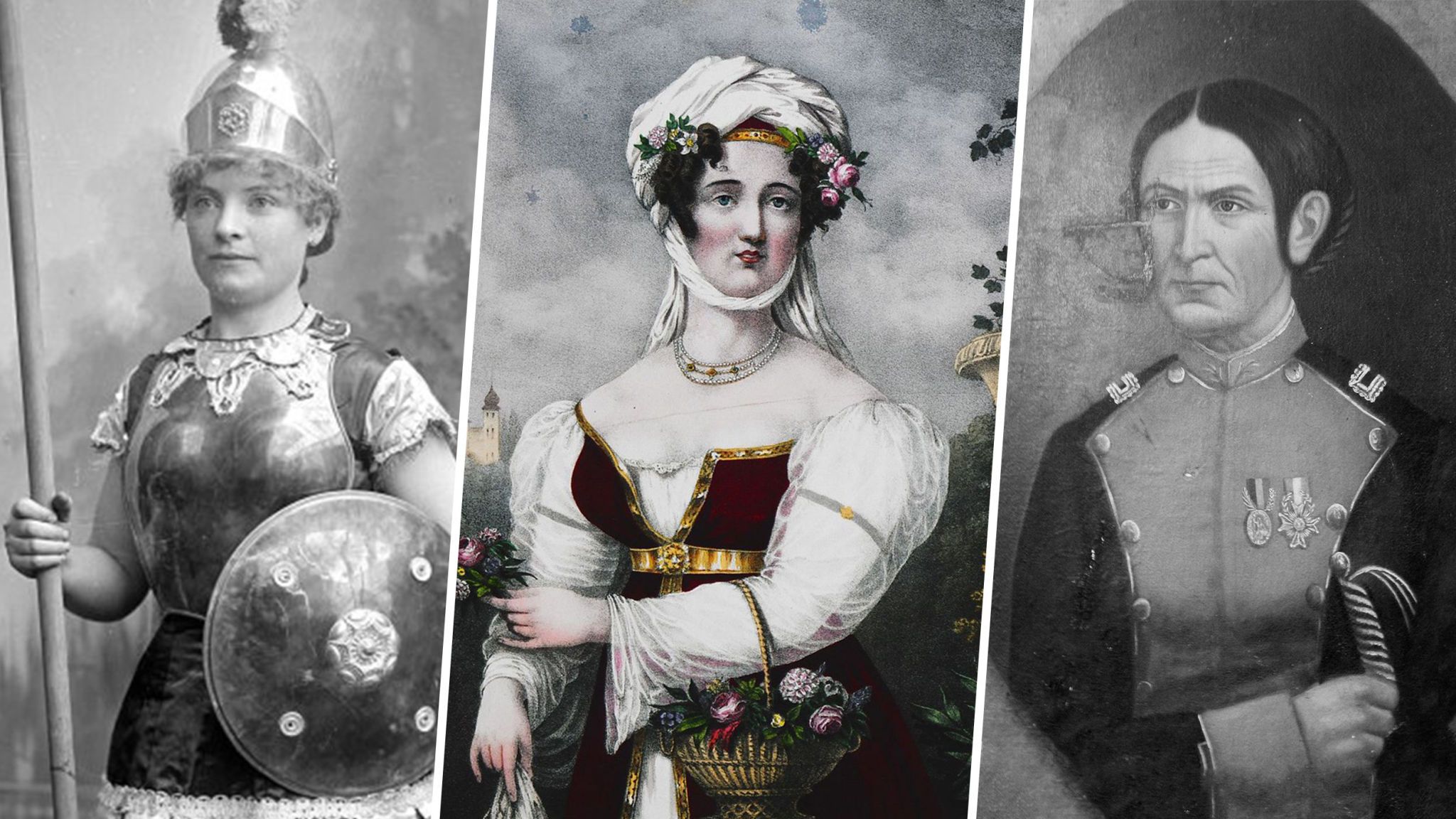
Unfazed by the stench and squeals, Gei Ke loads the last of her farm-raised pigs into the pickup truck of a businessman. She shakes his hand and pockets a wad of cash. Ke, 48, exudes a cool swagger and has the fresh complexion of a woman 10 years younger. She entered a walking marriage, but her husband died 20 years ago from a heart problem. Both of her children have decamped for cities—her daughter is studying medicine, her son engineering. Though she keeps a steady lover, she doesn’t want him to share her home or family. “I see him from time to time,” she says. Asked if there are others, she only smiles.
For her part, Rada embodies the generational tension straining the community. Brash and fast-talking, she could be at home in a metropolis like Shanghai: jeans shredded at the knees, purse studded with metal spikes, an electric-blue streak dyed in her jet-black hair. Her smartphone buzzes every other minute with messages from friends on WeChat, China’s favorite social-networking app. She spends most nights at her apartment in Lugu Lake Town, the largest community on the Sichuan side of the lake, but still keeps a “flower room” (the term Mosuo use for a private bedroom for women of childbearing age) on her family farm in Shekua village, about a 15-minute drive outside town, where her mother, grandmother, three aunts, and two uncles reside.
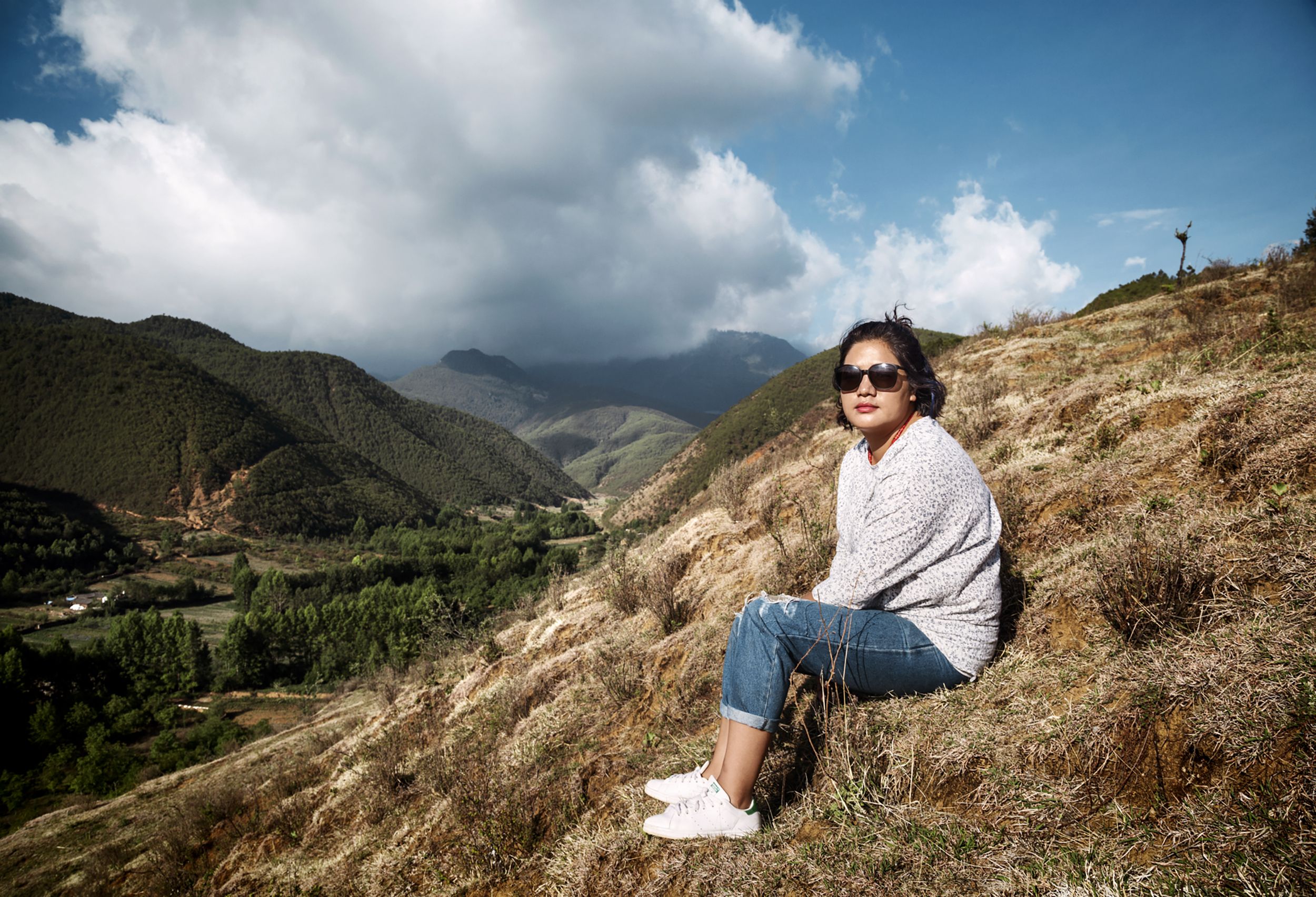
Sadama Rada, 29, who wears modern clothes but practices ancient traditions is the bridge between old and new Mosuo generations.
Were it not for a chance encounter at age 13 with German filmmakers drawn to Lugu Lake by the Mosuo mystique, Rada might have stayed an uneducated farm girl like her mother and aunt. (Now, Mosuo children are mostly all educated, but older generations, including Rada’s, were rarely schooled.) American friends of the filmmakers in Lijiang, the nearest city, then a daylong drive away, agreed to teach Rada for free. She moved to Lijiang in 2005 and spent five years there learning English and Mandarin writing. Her English improved, as did her knowledge of expat Irish pubs. She traveled to other big cities throughout China and eventually to Europe, spending several months touring and giving presentations as a kind of ambassador for Mosuo culture.
Rada’s duality has made her a rare asset as visitors flock to the region in greater numbers. One of just a handful of English-speaking Mosuo, she was hired nine years ago by the state tourist agency to guide visiting dignitaries and film crews. She says much of her time is spent debunking myths about the promiscuous habits of Mosuo women, stories readily echoed by tourist brochures and media coverage that tends toward the sensational.
On a cloudy afternoon, we stop by Walking Marriage Bridge, one of the main attractions around the lake. The bridge, lined with clusters of water lilies, once connected two villages on opposite sides, giving lovers easy access during the night. Today, the place doesn’t exude a whiff of romance. Throngs of tourists disgorge from luxury coaches to snap pictures with selfie sticks, eat ice cream, and have their hair braided. “[The Mosuo] are exotic, full of mystery,” says Ron Li, a 45-year-old male garment maker from Guangzhou on a package tour. Further along, a pack of 20-something men asks a group of tourist women where they’ll be drinking that night. Aside from the food vendors and souvenir hawkers catering to these tourists, Mosuo are scarce.
Weaving through the crowds, Rada ticks off some of the stubborn misconceptions about her culture: that women tickle the hands of prospective male partners to signal sexual interest; that women have a revolving door of sex partners; that they often don’t know the names of the children’s fathers. “That would not look good,” she says. Researchers have noted that in past generations, some Mosuo had upward of 30 or 40 partners in their lifetime, but those freewheeling days are long gone. Now, women might have several walking marriages—one at a time—throughout their lifetime, or, under certain rare circumstances, open relationships. Hookups are unusual—if and when they do occur, nobody talks openly about them.
Now, women might have several walking marriages—one at a time—throughout their lifetime, or, under certain rare circumstances, open relationships.
Rada’s mother and father met in their late teens, the age Mosuo typically start having sex. Zengheng asked an elder to approach Rada’s grandmother for approval. Dabu agreed, and the couple insist they have been faithful for more than 30 years. In contrast to the storybook romance, in which the man calls on the woman, their relationship flows both ways. Rada’s mother, Bi Ma Rada, 53, freely visits Zengheng day or night; his place is a 10-minute walk from her home. There is no concept of divorce, either. If they wanted to split up, they could simply go their separate ways, but Rada insists the walking marriage has imbued their bond with a freshness that has not worn off with time.
Her words are tinged with longing. One year ago, she ended a three-year relationship with her Mosuo boyfriend. She was ready to introduce him to her parents but says he was “not serious,” irresponsibly spending his family’s money. So Rada left. It was a hard breakup, especially in a place where anonymity is impossible, but she’s enjoying her freedom. She says her next partner doesn’t have to be Mosuo or accept walking marriage, but he must respect her need for tradition and independence. And keep up with her.
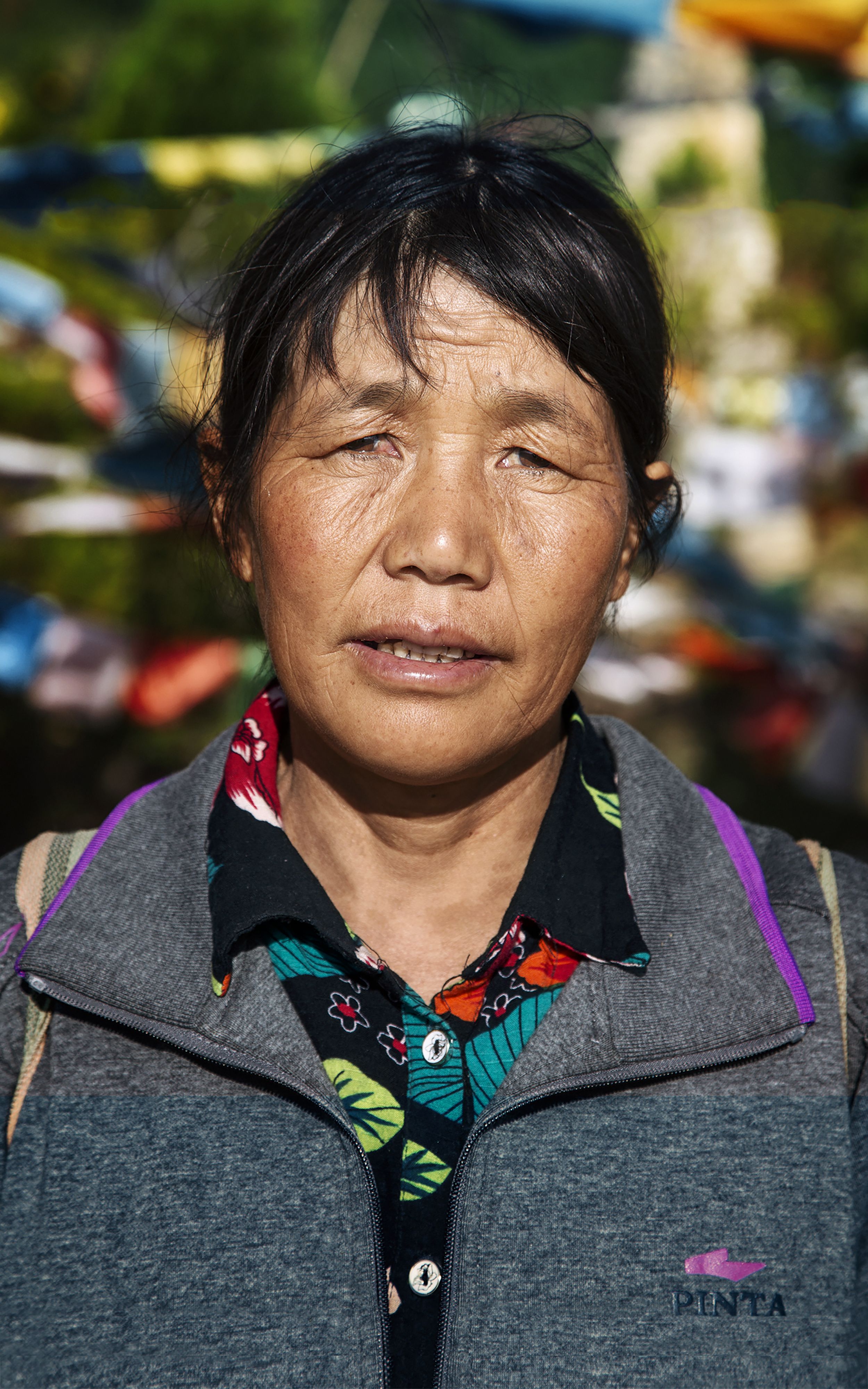
Sadama Rada’s mother, Bi Ma Rada.
That night, Rada and her friends head to one of three karaoke studios in Lugu Lake Town. The private room has a table spread with 50-odd bottles of light beer, sliced watermelon, and packs of cigarettes. For three hours, the Mosuo women lead full-throated renditions of Mongolian love ballads and Korean pop songs, lubricated by a never-ending series of toasts. Rada’s best friend, Bi Ma La Cou, 32, stands up, straightens her blouse, and challenges the owner of a hotel to a chugging contest. He’s halfway done with his beer when she slams her bottle down and taunts him for being a lightweight.
La Cou works with Rada at the tourism office to support her 5-year-old daughter. She dumped her husband three years ago and says she’s not looking for another walking marriage. “We don’t depend on men to do everything for us,” she says. “We know how to get what we need.”
It’s past 1 a.m. when the group leaves to find something to eat. Rada and La Cou head the pack; the men are swaying along arm in arm, mumbling a tune. “C’mon, you guys have short legs or something?” Rada shouts. “Hurry up!” At the restaurant, yet another round of drinks is poured. Soon several men fall asleep in their seats. The women are still going strong.
The next morning, Rada follows her mother, Bi Ma, up a steep hillside to a sacred site overlooking their village. Bi Ma is wearing her usual tracksuit and trucker’s hat, a basket strapped to her back. Rada is close at her heels, making sure not to scuff her white Adidas Stan Smith sneakers. If she’s hungover, it doesn’t show, though she admits she’s gained weight from all the drinking and idle time in town. “You’re getting soft,” her mother says, jabbing her tummy. Rada counters that her work in town supports the family, then playfully shoulder-bumps her mom off the path.
At the top of the hill, prayer flags crackle in the spring breeze. Bi Ma places some pine sprigs in the fireplace of a stupa—a Buddhist shrine—and sets them alight. The Mosuo traditionally practiced Daba, an animist faith that venerates ancestors and the mother goddess. It was suppressed for years by the Chinese government, and more recently the influence of Tibetan Buddhism has come to play a larger role in daily life. Bi Ma waves the smoke toward the village and asks for a bountiful crop in the upcoming harvest. Rada is beside her, and together, they turn and bow to the Mountain Goddess towering across the water.
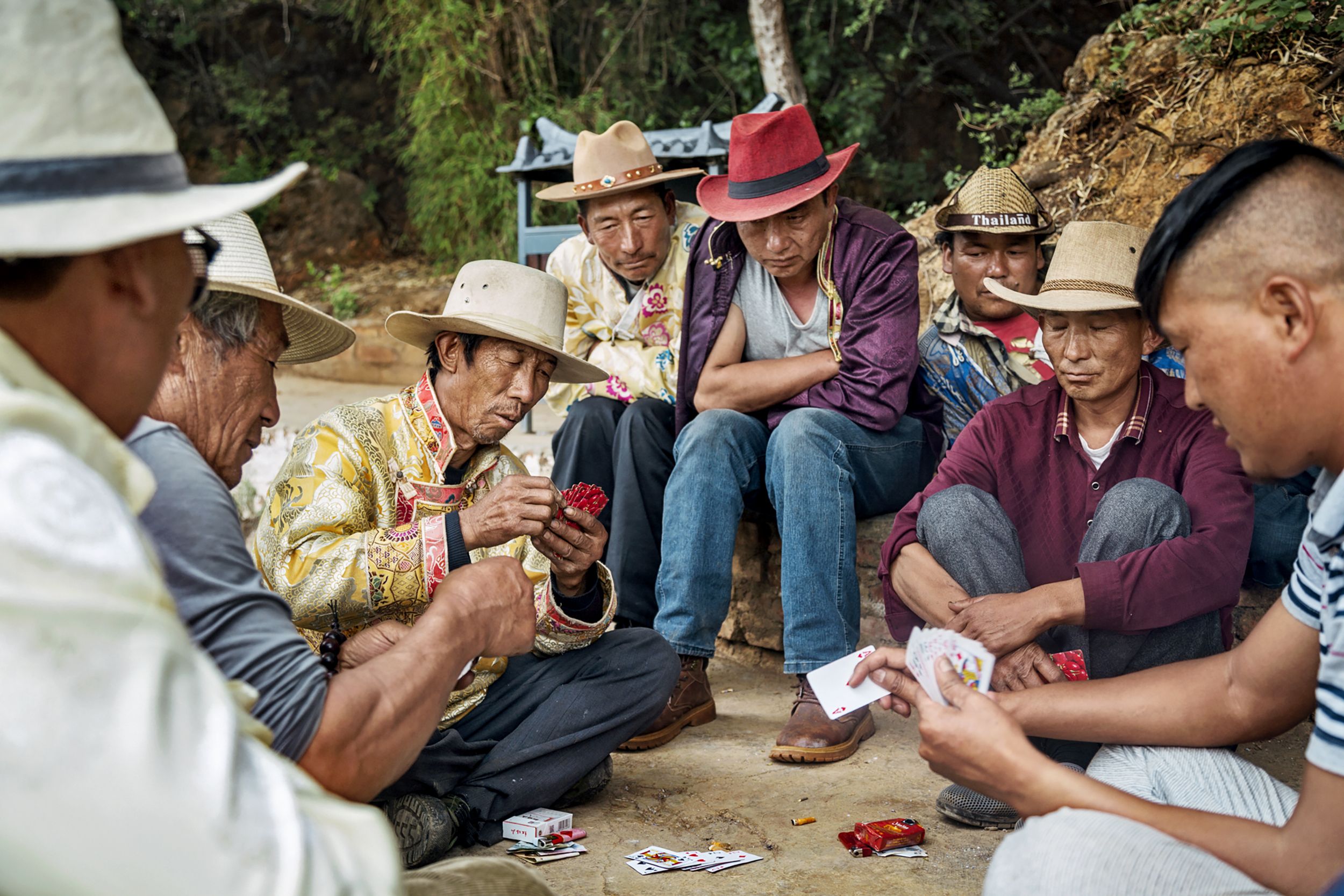
Mosuo men play an afternoon game of cards by Lugu Lake
They head into town for coffee, one of the better perks that foreign influence has brought. The café owner, 33-year-old Yang Zha Xi, reflects on what it’s like to be a man in a community full of fierce women. “For a society to be successful, men and women both need to be strong,” he says. “Outsiders think we’re lucky, that we change girls every night, which is crazy. It’s not a good idea to mess around if you’re with a Mosuo woman!” One Mosuo who would agree with him is Yang Erche Namu, the best-known and most controversial Mosuo. After leaving the region, she became a singer and actress in Shanghai and then Beijing, gaining notoriety for public quarrels and bold stunts, including proposing to former French President Nicolas Sarkozy. Zha Xi slides one of Namu’s nine autobiographies across the table. The passages, printed on matte pink paper, straddle the line between empowered and embittered: “Girlfriends: We’re all too lively, but this liveliness is our stability. Men don’t understand this. Men like fresh things, but men are never fresh. That’s why they can’t handle us...An apartment, for a woman, is more important than having a man. In this world, you can wish for beautiful things, but never wish to rely on a man for your entire life.”
Namu’s musings are interspersed with provocative portraits of her smoking, braless in silken slips, hips cocked and tongue lolling. Some Mosuo dismiss her as a self-promoting sexpot whose antics feed gross misconceptions about Mosuo culture. Others consider her a feminist icon, unafraid to confront the ills of Chinese patriarchy head-on.
At nightfall, tourists attend one of the cultural plays staged for them at a lakeside pavilion. A colorful light show kicks off, and archetypal Mosuo males in cowboy boots and hats dance up a sweat. The bulbs dim, and one of the men clambers up a ladder to serenade his beloved, her form silhouetted behind a curtain. He steps inside. Spectators gasp and swoon. Near pandemonium breaks out afterward when everyone is invited onstage to take pictures with the performers.
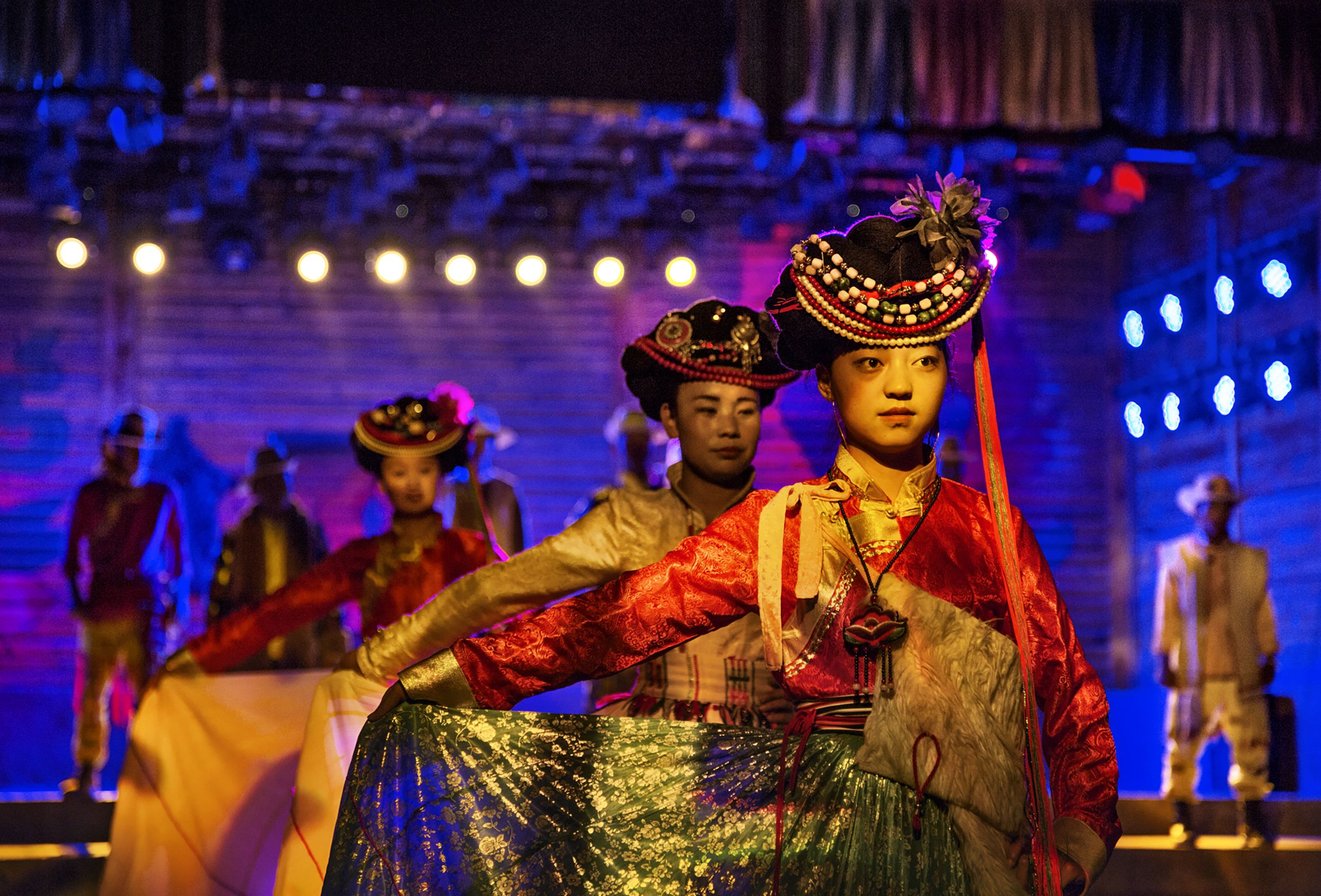
Mosuo women perform a nighttime cultural show for Chinese tourists
In the coming months, the number of tourists is poised to swell. Road improvements have cut driving time from Lijiang from a full day down to three hours. A new airport has opened near Lugu Lake, along with a modern bus station and sprawling heritage museum. All this development has furnished Rada with a steady job and perspective that extends far beyond the village. Her feelings about the future, however, are mixed. For the many economic benefits tourism has brought, she recognizes the impact outsiders are having on the “natural way we live”—herself included. “We hope that all the attention does not destroy us,” she says.
We hope that all the attention does not destroy us.
Before heading back to the city, Rada pays a final visit to the farm, joining her grandmother by the fire for a cup of tea. Soon, Rada’s mother and aunt come in from pruning corn: “We are working the fields, and you are only working your mouth, Sadama. When are you going to have some children to help us? Why don’t you have a man? If you get too old, no one will take you.” Rada takes the teasing in stride. “They are always giving me a hard time, making jokes,” Rada says. “They don’t understand I am happy right now. I am free to explore.”
In August, Rada traveled to Germany and Austria to help present a documentary on the Mosuo in which she is featured. She enjoyed seeing old friends, teaching people about her culture, and eating more of the cheese she’s craved since her first visit. But the novelty of Europe wore off quickly, leaving her homesick for Lugu Lake. “I will always come back here—it’s a very special place, the most beautiful I know.” I remind her that if she settles here, she will one day become dabu, the boss of the household. “Yes,” she smiles. “I’d like that.”
Jason Motlagh is an International Reporting Fellow at the Pulitzer Center.